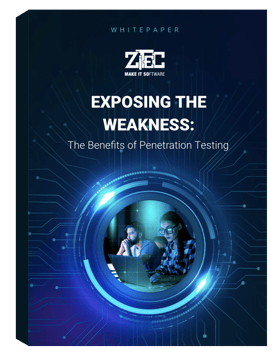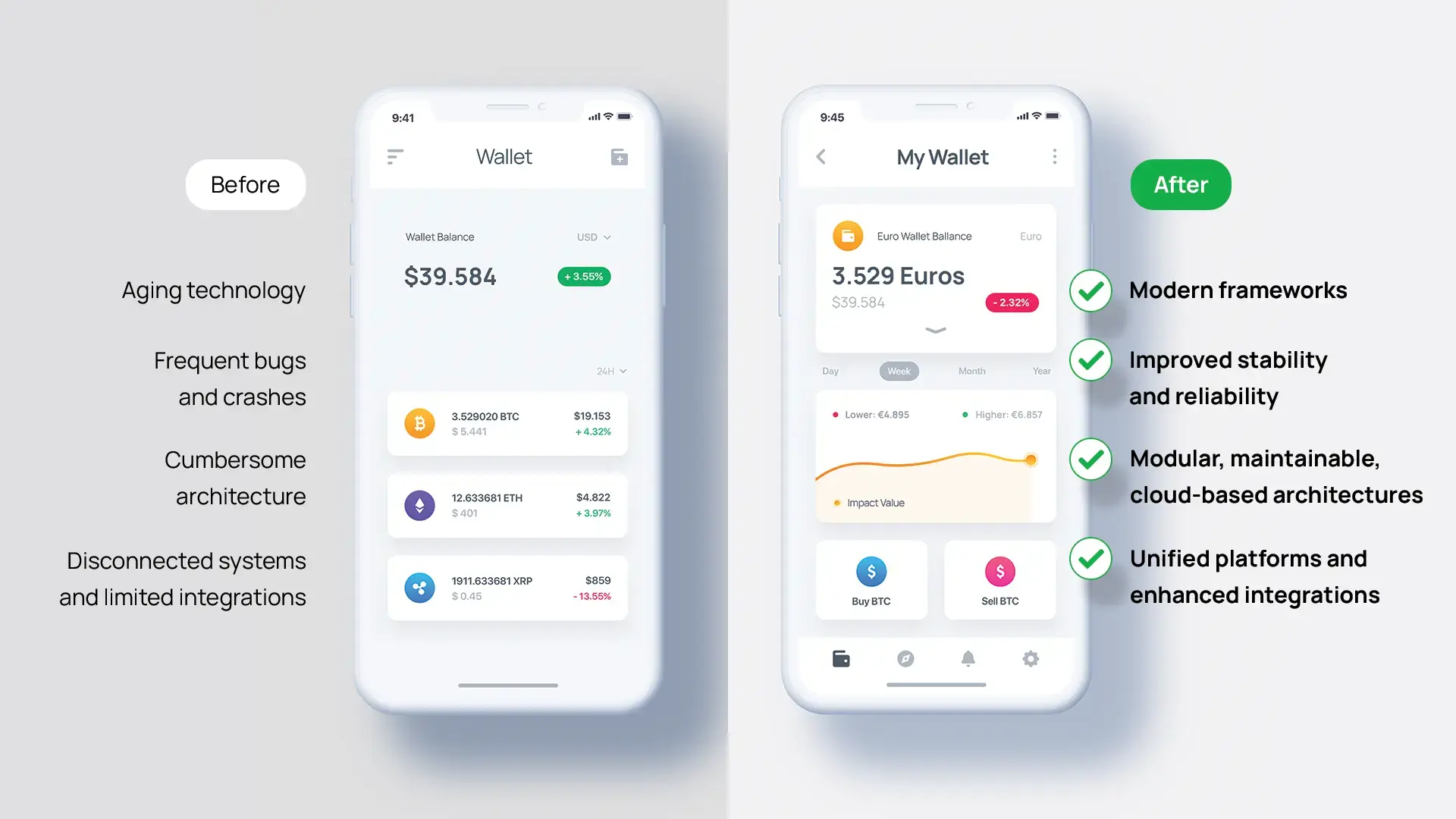Six in ten internet users buy something online every week, with the most spending happening in consumer electronics and fashion. In an age where data is the new gold, this financial pursuit takes on new meaning.
With a wealth of customer information in possession, the retail sector can be likened to a modern-day El Dorado. However, this rich data repository also draws the attention of cybercriminals, making it unsurprising that the industry is a frequent target for attacks. Last year, 24% of all cyberattacks, more than in any other industry, were directed at retailers.
Companies in retail face a double bind, needing to use more data to boost sales and efficiency, while having to protect themselves from cyberthreats. The more they embrace advanced data-driven tech like big data and data warehousing, the bigger the challenge becomes.
|
At Zitec, working alongside companies across industries - with retail being one of our focus areas - we witness firsthand the complexities our customers grapple with daily. From fostering a robust culture of security to ensuring that their investments in cybersecurity tools yield genuine risk reduction, the journey is intricate.
The answer lies in not just modernizing infrastructure but also in embedding a culture of security within the organization. It's about ensuring that every stakeholder, from developers to product owners, is aligned with the security vision. It's about moving beyond the traditional reactive approach to cybersecurity and embracing a proactive stance, where security is an integral part of the development process.
Key challenges for retailers in keeping their security robust while modernizing infrastructure
The stakes are high, and the statistics are clear: cybercrime is on the rise, and businesses, including retailers, are increasingly vulnerable. Statista’s Cybersecurity Outlook estimates that the global cost of cybercrime will surge from $8.44 trillion in 2022 to $23.84 trillion by 2027.
Retailers face the following dilemma: they need to innovate rapidly in an increasingly competitive environment, while ensuring that cybersecurity remains a top priority.
In other words, take chances, while still putting safety first. It sounds complicated? It is!
But the need for digital transformation is shaping retail as we speak. Consumers today expect memorable online and in-store experiences, personalization, and rapid delivery.
To meet these demands, retailers need to take their time while hurrying up. They need to be able to integrate multiple legacy systems and modernize their infrastructure, while also embracing new technologies such as Artificial Intelligence (AI), Augmented Reality (AR), or Virtual Reality (VR). While these innovations enhance customer experiences, they also create new avenues for cyberthreats.
Let’s take a closer look at the main challenges the industry faces:
-
Legacy systems. Many retailers still rely on legacy systems that may lack essential security features. Updating and securing these systems is a significant challenge.
-
The eCommerce explosion. The surge in online shopping has expanded the attack surface for cybercriminals. Retailers must secure their eCommerce platforms, payment gateways, and customer databases. The rise of mobile shopping apps further amplifies the pressure.
-
Data privacy concerns. Stricter data privacy regulation like the General Data Protection Regulation (GDPR) in the EU and the California Consumer Privacy Act (CCPA) in the US - just to mention a couple of the best known - demand that retailers handle customer data with extra care. Failing to do so not only risks hefty fines but also erodes consumer trust.
-
Supply chain vulnerabilities. Retailers are reliant on intricate supply chains. Cyberattacks on suppliers or logistics partners can disrupt operations and compromise security. Managing the security of the entire supply chain is a pressing concern.
In order to keep your clients’ data safe, you need to be able to cover a lot of ground. Because, as we will see next, the cybersecurity threats for retailers are neither few nor small.
Next, we’ll take a closer look at the most important.
Common cybersecurity risks for retailers
Cyberattacks, ranging from phishing schemes to ransomware, pose significant challenges to retailers. Understanding and preventing these threats and their potential consequences is vital. In this context, let's explore some prevalent cybersecurity hazards encountered by retailers.
- Phishing attacks involve deceptive emails, messages, or websites designed to trick employees or customers into revealing sensitive information such as login credentials or payment details. Successful phishing attacks can lead to unauthorized access to critical systems, data breaches, and reputational damage.
- Ransomware attacks encrypt a retailer's data, holding it hostage until a ransom is paid, while Distributed Denial of Service (DDoS) attacks overwhelm online systems, causing service disruptions. Ransomware can result in data loss, operational downtime, and significant financial losses. DDoS attacks can disrupt online sales and damage customer trust.
- Regulatory and compliance risks: failing to comply with data protection regulation, such as GDPR or CCPA, can result in hefty fines and legal actions against retailers. In addition to substantial financial penalties, non-compliance can lead to loss of customer trust and other legal repercussions.
- Supplier cyberattacks can disrupt the supply chain, impacting a retailer's ability to stock inventory and fulfill customer orders. Supply chain disruptions can result in inventory shortages, delayed deliveries, and damage to customer satisfaction.
- eCommerce threats encompass a range of risks, including account takeovers (fraudsters gaining access to customer accounts), and the creation of fake websites to deceive customers. Account takeovers can lead to financial losses for customers, while fake websites erode trust in the retailer's brand.
- Credit card or gift card fraud: criminals engage in fraudulent transactions using stolen credit card information or exploit vulnerabilities in gift card systems. Retailers may face chargebacks and financial losses, and customers can experience unauthorized transactions.
- Point-of-sale (POS) malware infiltrates the POS systems used in physical stores to steal payment card data during transactions. POS malware compromises customer payment information, resulting in financial losses and potential legal liabilities.
- Insider threats can come from current or former employees with access to sensitive data who misuse their privileges or inadvertently compromise security. Insider threats can lead to data breaches, financial losses, and damage to the retailer's reputation.
The proactive security measures that retailers need to implement to prevent these risks range from educating employees and customers to partnering with trusted security experts to fortify their defenses against these ever-evolving threats.
The protection of sensitive data and the integration of legacy as well as new technologies all play a vital role in shaping the future of security for retailers. The compliance with stringent regulation, however, is another strong incentive for retailers to remain on top of their game.
Key cybersecurity regulation initiatives for retailers
In this section, we delve into the crucial cybersecurity regulation initiatives for retailers. These rules play a pivotal role in safeguarding customer data and fortifying digital resilience. Furthermore, their compliance is crucial to keeping your retail company away from unwanted scrutiny and reputational risks.
General Data Protection Regulation (GDPR)
GDPR, applicable in the European Union, imposes strict data protection rules requiring retailers to handle customer data with the utmost care. Retailers must implement robust data protection measures, including encryption and access controls, to ensure GDPR compliance. Failing to do so can result in significant fines.
Payment Card Industry Data Security Standard (PCI DSS)
PCI DSS is a global standard that mandates secure handling of credit card data by organizations. Retailers must adhere to PCI DSS requirements, including secure data storage and transmission. Compliance minimizes the risk of credit card fraud and data breaches.
The NIS2 Directive
The Network and Information Systems (NIS) Directive in the EU focuses on the security of network and information systems. Retailers must ensure the resilience of their digital infrastructure to withstand threats. Compliance with NIS2 requirements is essential to prevent disruptions.
Cybersecurity Act
The Cybersecurity Act establishes an EU-wide framework for certifying the cybersecurity of digital products, services, and processes. Retailers can benefit from certified cybersecurity solutions to enhance the security of their digital offerings.
Even with all these rules in place, regulators are sometimes struggling to keep up with the technological evolution. One thing is for sure: the emergence of AI has turned these efforts into a full-throttle race. That’s right, our next section addresses data and the AI revolution’s impact in cybersecurity. But let’s start from the top.
Data protection and integration across legacy systems
Data protection is a critical concern for retailers, given the vast amount of sensitive customer information that goes through their systems every day. The challenge arises from the proliferation of multiple and often outdated systems where data is stored.
Retail companies must develop strategies to protect customer data across these diverse platforms. This involves data encryption, access controls, and the development of a unified approach to data security.
Data analytics is indispensable for retail businesses, aiding in informed decision-making, customer personalization, and overall growth. However, it also presents cybersecurity challenges.
Striking a balance between harnessing the power of data analytics and safeguarding the integrity and confidentiality of the data is essential. Robust data encryption and access controls are a must these days.
As networks grow complex, AI is emerging as a vital tool to bolster defenses and counter evolving threats. The technology will most likely play a pivotal role in enhancing the performance of IT security teams. While it offers advanced threat detection capabilities, it can also be exploited by cybercriminals, so it’s a double-edged sword.
And as the cyberattack surface expands relentlessly, the inclusion of artificial intelligence (AI) and machine learning becomes imperative. These technologies swiftly analyze vast datasets, tracking down an array of threats, from malware to phishing attempts.
|
AI brings forth a host of advantages in cybersecurity. It excels at detecting new threats, battles against bots, predicts breach risks, and enhances endpoint protection. AI's proactive approach is essential in today's evolving threat landscape.
Find out more on how you can protect yourself from cyber attacks using the power of AI.
While AI holds great promise, it also poses risks. Organizations require substantial resources for AI systems, and inaccurate data can lead to false positives. Moreover, adversaries can exploit AI, employing it to deceive and enhance their cyberattacks.
Choosing a trusted security partner in retail
The complexities of cybersecurity for a retail business today require the right partner. One that will be able to understand the multiple challenges that businesses face in their quest for digital transformation. Ensure you select a proactive ally by your side, ready to provide robust solutions that encompass the full spectrum of your security needs.
Let’s check out the top 5 things our clients say they looked for when researching a security partner:
- Proactive approach to threat prevention. Eliminate security risks before cybercriminals exploit them. Ensure that your company is ready to detect, react, and recover from incidents promptly. Look for a partner with a proactive stance, anticipating and mitigating threats before they become breaches.
- Know-how in regulatory compliance. Prevent cyber issues and maximize your software’s lifecycle while your business abides by the regulatory and compliance levels required.
- Experienced professionals. Having a team of security engineers and testers with key knowledge in multiple technologies across various industries is critical. Not only that, but you want to make sure your security experts understand the development process and can take a holistic, integrated DevSecOps approach.
- End-to-end security. Make sure your security partner gets involved right from the very first discussions in the software deployment phase and can provide comprehensive protection. Choose a partner that can cover the entire spectrum, from safeguarding our customers’ eCommerce platforms to protecting sensitive data and fortifying supply chain security.
- Last but not least, proven track record. Working with customers and helping them take a proactive approach to security is always my favorite part of it all. At Zitec, we have a history of successfully partnering with a diverse range of retail clients. Our expertise has been instrumental in enhancing the security posture of companies like Flanco, iELM, Leroy Merlin, Sameday, Flip, and Cars2Click.
Our comprehensive services encompass a wide spectrum, from assisting clients in attaining complex certifications to ensure compliance with industry standards, to offering security governance for cloud infrastructure, employee security training, and guidance on device management policies.
Furthermore, we excel in performing pentesting and code reviews for digital ecosystems, managing vulnerabilities, configuring security tools, implementing secure software development methodologies, enhancing detection rules, enabling rapid threat responses, and facilitating efficient disaster recovery planning.
Takeaways: invest in leading industry expertise and integrate security early in your development cycle
More and more, customers trust retailers with their data in exchange for the promise of a unique experience. Yet innovation is just one side of the coin. As highlighted in this article, a comprehensive cybersecurity strategy is becoming an imperative for the retail industry.
Retailers must embrace integrating security early in their development processes. This holistic approach ensures that security becomes part of development, thwarting vulnerabilities before they become insurmountable challenges. Having a culture of security in place will provide the biggest benefits for the future of your company.
Yet hiring the best IT experts is no longer enough for effectively securing enterprise-level attack surfaces, and might come with considerable effort and cost anyways, given the talent shortage in this area of expertise. AI can help your company address the problem in a cost-effective manner, while also providing essential analysis and threat detection capabilities that empower security professionals to reduce breach risks and strengthen overall security postures.
With the right security partner by your side, you can start to proactively anticipate challenges and come up with inventive solutions, protecting your business and your customers.
Prioritizing security will enable you to fortify your operations, nurture customer trust, and ensure long-term growth.







